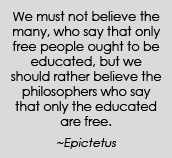|
The topic of the emotional relationship between
educators and learners is one that many makes many
educators uncomfortable. The dominant educational
culture in which most of us work has several unwritten yet
strong and abiding rules:
Objectivity is better than subjectivity and objectivity
requires emotional distance
Real learning is about the mind and thinking, not
emotions and feelings
Being emotionally invested, especially in an educational
setting, is 'soppy', not 'serious'
Contrast these statements, and the attitudes and assumptions
underlying them with the
following quotes:
If you want students to truly grow and improve, then you
have to value who they are and what they are doing while they learn.
—Kathy Burke
If I'm not emotionally invested in someone's growth, I
can't provide the assessment feedback that helps that
growth.
—Dan Apple
These two statements are affirmations of
emotional investment on the part of a mentor or
educator. It is critical that both statements cite
growth, as opposed to just learning, as the goal of an
educational experience.
There is fundamental difference between "learning" and
"growing". According to "Differentiating Knowledge from
Growth" (Faculty Guidebook 2.2.4), knowledge is
the result produced from learning. Growth, on the other
hand, is the result of personal development produced by
self-assessment. This is not to denigrate learning; on
the contrary, learning is fundamental to successful
performance in any context. But if the goal is not just
demonstration of knowledge attained, but actual growth,
then what we're ultimately looking for is a trigger for
improvement, which is the essence of growth and
development.
Improvement
is the outcome of assessment, based upon a model of performance
where each of the factors that comprise a performance
may be addressed systematically. Leaving the
self-assessment aspect for the moment, let's consider
what we mean when we talk about "performance." According to the Theory of
Performance (FGB 1.2.1), one can predict that
performance will increase if any of the following
five components of performance are improved: knowledge,
learning skills, awareness of identity, experience in a
new context, and factors within the performer’s personal
life. It is critical to note that these components are
not limited to only the cognitive — identity,
experiences, and personal factors all contribute to an
individual's performance, for good or ill, and learning
skills (skills that when gained actually improve one's
ability to learn) come from the social and affective, as
well as cognitive domains. If an educator is committed
to helping students improve their performance as
learners, then there must be awareness and acceptance of
learners as more than cognitive beings.
This is the beginning of emotional investment:
acceptance that learners are social and emotional even
as they work within a setting traditionally focused upon
only the cognitive domain. This acceptance should
be easier than it usually is; after all, educators are
also social and emotional beings, struggling with issues
of identity, experiences and personal factors.
The final nudge from emotional acceptance to emotional
investment comes with the application of assessment. Unlike evaluation,
where the instructor evaluates (judges) the learner's
performance, assessment requires focus upon affirming
(a social and affective response)
what was positive about a performance as well as working
to help the performer improve his or her performance. A
strong assessment demonstrates belief in the value and
potential of another. You have to want to see a
learner improve and grow in order to spend the time and
energy a strong assessment requires. That wanting means
that you're emotionally invested in the growth and
improvement of your students. It may not always be easy
but it is the surest possible way to help a learner
succeed.
| |
|
 |
Think back on the teachers, mentors, and coaches
that you have had. When did you experience the
greatest learning and growth? How important was
that other person to your learning/growth? How
emotionally invested were they? Perhaps more
importantly, how did their emotional investment
motivate you? The more we analyze the most
successful mentoring relationships, the more we
see that the relationship was one of emotional
investment. Often the investment begins based
upon cognitive concerns but when real success
and abiding transformation (the hallmarks of
growth and personal development) are achieved,
the nature of the investment always
crosses over into the social and emotional
domains.
|
|
![]()


